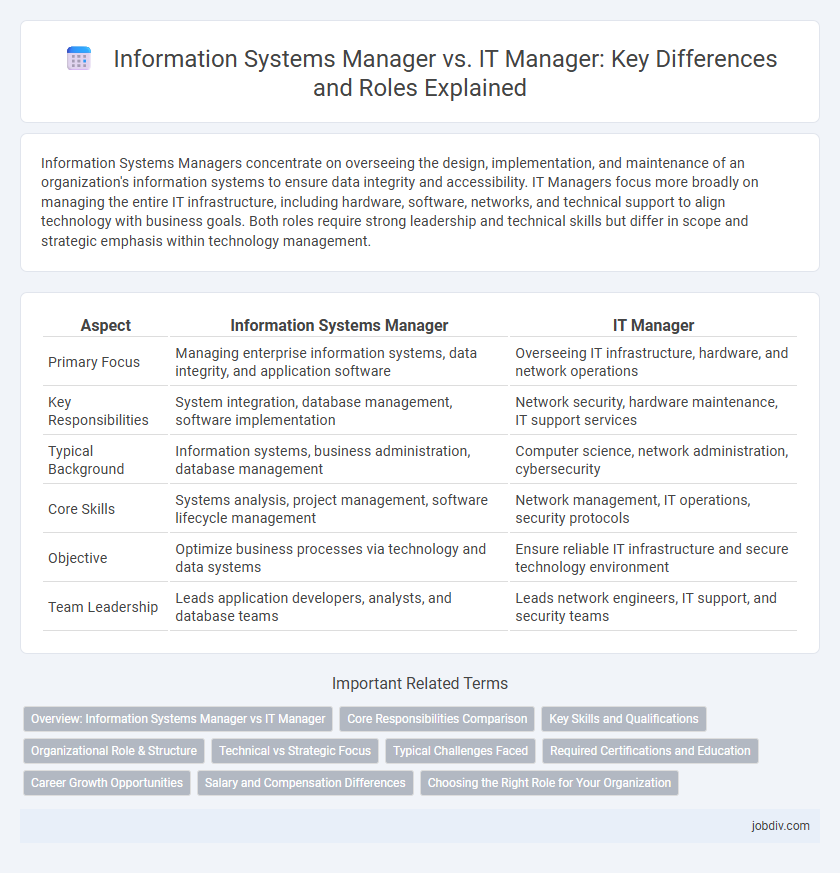Information Systems Managers concentrate on overseeing the design, implementation, and maintenance of an organization's information systems to ensure data integrity and accessibility. IT Managers focus more broadly on managing the entire IT infrastructure, including hardware, software, networks, and technical support to align technology with business goals. Both roles require strong leadership and technical skills but differ in scope and strategic emphasis within technology management.
Table of Comparison
| Aspect | Information Systems Manager | IT Manager |
|---|---|---|
| Primary Focus | Managing enterprise information systems, data integrity, and application software | Overseeing IT infrastructure, hardware, and network operations |
| Key Responsibilities | System integration, database management, software implementation | Network security, hardware maintenance, IT support services |
| Typical Background | Information systems, business administration, database management | Computer science, network administration, cybersecurity |
| Core Skills | Systems analysis, project management, software lifecycle management | Network management, IT operations, security protocols |
| Objective | Optimize business processes via technology and data systems | Ensure reliable IT infrastructure and secure technology environment |
| Team Leadership | Leads application developers, analysts, and database teams | Leads network engineers, IT support, and security teams |
Overview: Information Systems Manager vs IT Manager
Information Systems Managers oversee the strategic planning, implementation, and maintenance of an organization's information systems to support business goals. IT Managers focus on managing the day-to-day operations of IT infrastructure, including network administration, hardware, and software support. Both roles require leadership in technology management but differ in scope, with Information Systems Managers emphasizing system integration and business alignment, while IT Managers prioritize operational efficiency and technical support.
Core Responsibilities Comparison
Information Systems Managers oversee the strategic alignment of technology with business goals, focusing on system development, integration, and ensuring optimal data management across the organization. IT Managers handle the operational aspects of IT infrastructure, including network administration, hardware maintenance, and technical support to maintain system reliability and security. Both roles require strong leadership, but Information Systems Managers prioritize long-term planning and innovation while IT Managers emphasize day-to-day technology operations.
Key Skills and Qualifications
Information Systems Managers require expertise in systems analysis, database management, and strategic planning to align technology solutions with business goals, alongside strong leadership and communication skills. IT Managers focus on network administration, cybersecurity protocols, and IT infrastructure management, emphasizing problem-solving abilities and technical certifications such as CompTIA Security+ or Cisco CCNA. Both roles benefit from project management experience and knowledge of emerging technologies but differ primarily in their scope of responsibility and technical specialization.
Organizational Role & Structure
Information Systems Managers oversee the strategic implementation and maintenance of an organization's technology infrastructure, focusing on aligning IT resources with business goals. IT Managers typically handle the day-to-day operations, managing technical teams and ensuring system reliability and security within the organizational hierarchy. Both roles contribute to organizational efficiency, with Information Systems Managers playing a more strategic and cross-departmental role, while IT Managers emphasize operational management and technical support.
Technical vs Strategic Focus
Information Systems Managers prioritize strategic planning and aligning technology with business goals, ensuring IT initiatives support overall organizational objectives. IT Managers concentrate on the technical administration of hardware, software, and network infrastructure, focusing on system performance, maintenance, and troubleshooting. The distinction lies in Information Systems Managers driving IT strategy, while IT Managers handle day-to-day technical operations.
Typical Challenges Faced
Information Systems Managers often face challenges in aligning technology strategies with business goals while managing complex system integrations and ensuring data security compliance. IT Managers typically struggle with maintaining network infrastructure reliability, addressing cybersecurity threats, and managing day-to-day technical support for end-users. Both roles require balancing budget constraints with rapidly evolving technological demands and regulatory requirements.
Required Certifications and Education
Information Systems Managers typically require a bachelor's degree in information technology, computer science, or a related field, with certifications such as Certified Information Systems Manager (CISM) or Project Management Professional (PMP) enhancing qualifications. IT Managers often hold degrees in computer science, information technology, or business administration and benefit from certifications like CompTIA Network+, Cisco Certified Network Associate (CCNA), or Microsoft Certified: Azure Administrator. Both roles prioritize strong technical expertise and leadership skills, but Information Systems Managers focus more on strategic planning and information system integration, while IT Managers emphasize hands-on management of IT infrastructure and support services.
Career Growth Opportunities
Information Systems Managers often have broader responsibilities overseeing the integration of technology with business processes, creating more diverse career growth opportunities in strategic planning and digital transformation. IT Managers typically focus on managing IT infrastructure and support teams, which can lead to growth in technical leadership and specialized IT domains. Both roles offer pathways to executive positions, with Information Systems Managers frequently advancing towards Chief Information Officer (CIO) roles and IT Managers moving into Chief Technology Officer (CTO) positions.
Salary and Compensation Differences
Information Systems Managers typically earn higher salaries than IT Managers due to broader responsibilities involving strategic planning and system integration. Data from the Bureau of Labor Statistics shows the median annual wage for Information Systems Managers is approximately $151,150, compared to $130,000 for IT Managers. Compensation packages for Information Systems Managers often include performance bonuses and stock options, reflecting their critical role in aligning IT with business objectives.
Choosing the Right Role for Your Organization
Information Systems Managers prioritize aligning technology with business goals by overseeing system integrations, data management, and enterprise applications to enhance organizational efficiency. IT Managers focus more on maintaining IT infrastructure, managing technical teams, and ensuring network security and support services for uninterrupted operations. Choosing the right role depends on whether your organization needs strategic technology alignment and data governance or robust IT operations and infrastructure management.
Information Systems Manager vs IT Manager Infographic

 jobdiv.com
jobdiv.com